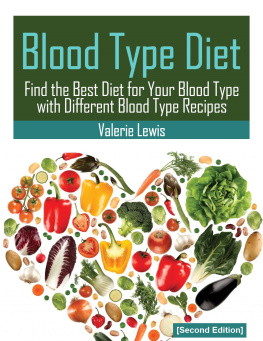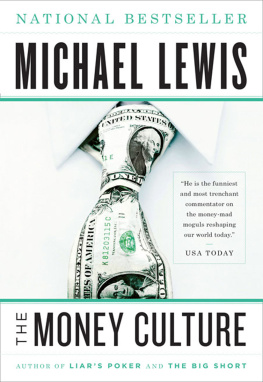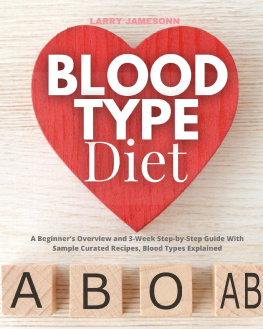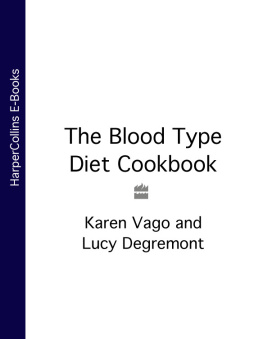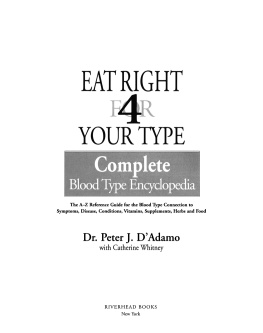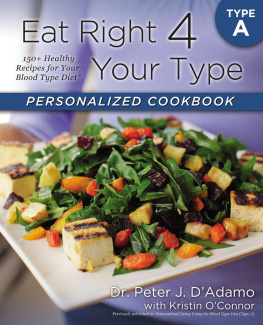Table of Contents
Blood Type Diet
Featuring Blood Type Recipes
Valerie Lewis
Copyright 2013 Valerie Lewis
All rights reserved.
Blood Type Diet Introduction
How the Blood Type Affects Diet
The blood type diet has gained in popularity over the past two decades since Dr. Peter D'Adamo first came out with his book 4 Blood Types, 4 Diets, Eat Right 4 Your Type. While the existence for the need for such a diet remains controversial, you will find strong advocates for it along with their blood type theories. However, at this point and time, there has been no actual scientific or medical research in depth to prove or disprove the theories that a person should stick with a particular diet based solely on their blood type. You can find plenty of support in the theory, just run an internet search about this and see all the websites that stand behind the theory that each blood type needs a certain type of diet.
Since we are discussing the blood type diet, it helps to know the different blood types. We will touch on different types for introduction purposes. First, the blood type is measured from the antigens, the proteins that exist on red blood cells. The blood types O, A, and B are the most common. When a person is blood type A only the type A antigens resides on the surface of the red blood cells. The same goes with type B. Type AB contains both. Blood type O contains neither. There is a third antigen called the Rh factor and it either exists or does not, thus you have the "positive" and "negative" ratings of blood types. Of all the blood types, "O positive" is the most common in the world, with A being a close second.
A naturopathic physician name Peter D' Adamo is the pioneer who first came up with the blood type diet theory, devising an entire diet system around a person's blood type. Many others follow along with the blood type diet theory that the need for a particular diet for each blood type has evolved through the years due to the changes in the environment and in people's methods of obtaining food. He proposes that if a person eats certain foods that go against their blood types they will become weak and the result can show up as diseases and even weight gain.
Advice for Specific Blood Types In Addition to Proper Diet
Blood Type O
Dr. D'Adamo believes that type O people need to focus more on their daily goals, because they tend to react more impulsively, which can get them into trouble. By setting goals for all tasks, they can work to meeting them better. Gradual is the key to making lifestyle changes, especially with dieting. All meals need to be on a good schedule, preferably while sitting upright at the dining table. Stress is bad so big decisions are best left for a time of peace.
Blood Type A
Dr. D'Adamo believes that type A people are capable of great creativity but need to develop and keep a schedule each day to accomplish that. Type A's need their rest, but do not need to be slothful. Instead of lying in bed longer in the morning, work on taking a couple of good breaks during the day to help disperse the rest. Type A's do better with smaller meals, eating 5 small meals a day rather than 3 larger meals. Because type A people have more digestive issues, they need to slow down when dining, take time to chew the food. Eating right helps to keep their immune system strong and healthy.
Blood Type B
Blood type B people are very suggestive. Dr. D'Adamo recommends they use this ability to their advantage by visualizing their success, especially when it comes to eating a healthy diet. Type B people tend to be nonconformists but sometimes this gets them into trouble. They need to focus healthier when not conforming to their oppositions. They need plenty of rest because they have delicate circadian rhythms. They can serve this best by going to bed and getting up at the same time each day, getting at least eight hours of sleep. Type Bs thrive in groups and need those connections. They often excel at networking. They do well to eat a diet of brain enhancing foods. They should seek to do things to sharpen their minds and keep the brain active.
Blood Type AB
Dr. D'Adamo advises that type AB people are too competitive in life and should try to avoid this in social settings. Type ABs tend to become ritualistic and obsess about things that are completely out of their control. This is best dealt with by simply avoiding this type of thinking. Instead, they should release those things that are not within their reach. They do well to turn their lifestyle around slowly rather than jumping in all at once. They need to pace themselves for best results; gradual is the key to success when it comes to dieting. They will do well to cultivate meaningful relationships in a social setting, doing things that will impact and benefit others. Their success hinges on their ability to visualize the results and the outcome in a positive light. They need time alone, time to think and recharge. Physical activity is always good and a way to build up energy.
What the Opposition Says About Blood Type Diets
Those who oppose the blood type diet theory claim they have sufficient evidence supporting their belief; however, again, there is no real scientific or medical research evidence to disprove the theory. Again, do a search for the opposition and find many who support the opposing claim as well. The opposition's main concern is the lack of nutrition balance in the type A and type O diets and the opposition feels that the blood type diets should not be followed for long periods.
A newsletter put out by the Harvard Medical School recently cites the lack of scientific evidence for such diets. They question the theory asking what may happen if more than one blood type shows up in a family. This type of reasoning looks at two parents, where one may be (for an example) type O blood, and the other type A. No matter what blood type the child turns out to be, either A or O, it is believed they still have the predisposition of the same behavior as each parent's blood type.
Therefore, it is difficult to assume that a child with a parent with a different blood type as theirs would benefit from such a strict diet. They further reason that the diet may be beneficial if, and this is a big if, every single family member has the same blood type, and the blood type was handed down through the years from generation to generation. But this is rare, blood types vary as much as skin and hair color.
No diet is one hundred percent great without doing other things to live a healthy lifestyle. Diet is just a piece of the whole puzzle that makes up a complete person. Just choosing sensible foods is a start, meaning to choose fruits and vegetables, lean proteins and to stay away from processed and refined foods. Break bad habits such as smoking and drinking alcohol excessively. Sedentary lifestyles are unhealthy. People need to get up and move around in order to be healthy. Exercise is often overlooked and should be a part of every healthy regimen, even for those with limited physical mobility, being physically active is necessary. If there are physical limitations, seek the help of a physical therapist or a gym instructor to come up with an exercise routine just for you. Dieting, exercising, and healthy lifestyle choices all work together to make a person healthy and whole. Drinking plenty of water with any diet is a must too. Water helps to digest the foods and helps to clean the body. All these things work together, and in doing all of these things together you become healthier faster, reaching your health and fitness goals quicker.

